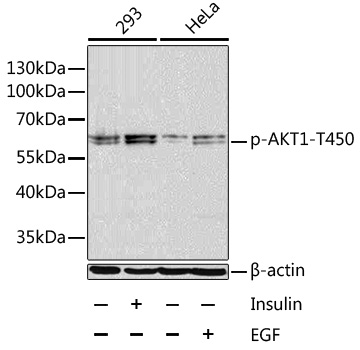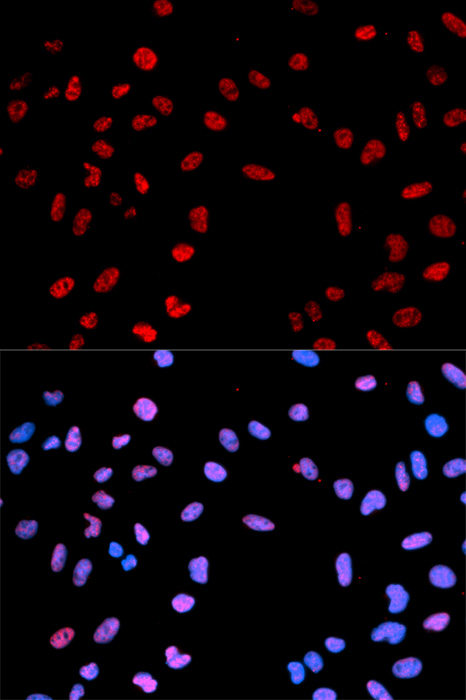Anti-Phospho-AKT1-T450 Antibody (CABP0004)
- SKU:
- CABP0004
- Product type:
- Antibody
- Application:
- WB
- Application:
- IF
- Reactivity:
- Human
- Host Species:
- Rabbit
- Isotype:
- IgG
- Research Area:
- Cell Death
Description
| 抗体名: | Anti-Phospho-AKT1-T450 Antibody |
| 抗体コード: | CABP0004 |
| 抗体サイズ: | 20uL, 50uL, 100uL |
| 申し込み: | WB IF |
| 反応性: | Human |
| 宿主種: | Rabbit |
| 免疫原: | A synthetic phosphorylated peptide around T450 of human AKT1 (NP_005154.2). |
| 申し込み: | WB IF |
| 推奨希釈: | WB 1:500 - 1:1000 IF 1:20 - 1:100 |
| 反応性: | Human |
| ポジティブサンプル: | 293, HeLa |
| 免疫原: | A synthetic phosphorylated peptide around T450 of human AKT1 (NP_005154.2). |
| 精製方法: | Affinity purification |
| ストレージバッファ: | Store at -20°C. Avoid freeze / thaw cycles. Buffer: PBS with 0.02% sodium azide, 50% glycerol, pH7.3. |
| アイソタイプ: | IgG |
| 順序: | TITP P |
| 遺伝子ID: | 207 |
| Uniprot: | P31749 |
| セルラーロケーション: | Cell membrane, Cytoplasm, Nucleus |
| 計算された分子量: | 48kDa/55kDa |
| 観察された分子量: | 60kDa |
| 同義語: | AKT, CWS6, PKB, PKB-ALPHA, PRKBA, RAC, RAC-ALPHA, AKT1 |
| バックグラウンド: | The serine-threonine protein kinase encoded by the AKT1 gene is catalytically inactive in serum-starved primary and immortalized fibroblasts. AKT1 and the related AKT2 are activated by platelet-derived growth factor. The activation is rapid and specific, and it is abrogated by mutations in the pleckstrin homology domain of AKT1. It was shown that the activation occurs through phosphatidylinositol 3-kinase. In the developing nervous system AKT is a critical mediator of growth factor-induced neuronal survival. Survival factors can suppress apoptosis in a transcription-independent manner by activating the serine/threonine kinase AKT1, which then phosphorylates and inactivates components of the apoptotic machinery. Mutations in this gene have been associated with the Proteus syndrome. Multiple alternatively spliced transcript variants have been found for this gene. |
| UniProt Protein Function: | Akt1: an oncogenic AGC kinase that plays a critical role in regulating cell survival and metabolism in many different signaling pathways. Dual phosphorylation is required for its activation. T308 is phosphorylated by PDK1 in the PI3 kinase pathway, and S473 is phosphorylated by mTOR in the mTORC2 pathway. The 'Lys-63'-linked ubiquitination of AKT1 by TRAF6 is important for its translocation to the plasma membrane, phosphorylation, and activation. When Akt is fully phosphorylated it translocates into the nucleus, undergoes 'Lys-48'-polyubiquitination catalyzed by TTC3, leading to its proteosomal degradation. Hyperactive or overexpressed in a number of cancers including breast, prostate, lung, pancreatic, liver, ovarian and colorectal. Over 160 protein substrates are known including many that regulate transcription, metabolism, apoptosis, cell cycle, and growth. |
| UniProt Protein Details: | Protein type:AGC group; AKT family; EC 2.7.11.1; Kinase, protein; Oncoprotein; Protein kinase, AGC; Protein kinase, Ser/Thr (non-receptor) Chromosomal Location of Human Ortholog: 14q32.33 Cellular Component: cytoplasm; cytosol; microtubule cytoskeleton; nucleoplasm; nucleus; plasma membrane; vesicle Molecular Function:ATP binding; enzyme binding; identical protein binding; kinase activity; nitric-oxide synthase regulator activity; phosphatidylinositol-3,4,5-triphosphate binding; phosphatidylinositol-3,4-bisphosphate binding; protein binding; protein kinase activity; protein serine/threonine kinase activity; protein serine/threonine/tyrosine kinase activity Biological Process: activated T cell apoptosis; cell differentiation; cell proliferation; cellular response to insulin stimulus; endocrine pancreas development; G-protein coupled receptor protein signaling pathway; G1/S-specific positive regulation of cyclin-dependent protein kinase activity; insulin receptor signaling pathway; insulin-like growth factor receptor signaling pathway; negative regulation of apoptosis; negative regulation of autophagy; negative regulation of caspase activity; negative regulation of fatty acid beta-oxidation; negative regulation of protein kinase activity; negative regulation of proteolysis; nitric oxide biosynthetic process; peptidyl-serine phosphorylation; peptidyl-threonine phosphorylation; phosphoinositide-mediated signaling; phosphorylation; platelet activation; positive regulation of blood vessel endothelial cell migration; positive regulation of cell growth; positive regulation of cellular protein metabolic process; positive regulation of endodeoxyribonuclease activity; positive regulation of endothelial cell proliferation; positive regulation of epidermal growth factor receptor signaling pathway; positive regulation of fat cell differentiation; positive regulation of glucose import; positive regulation of glycogen biosynthetic process; positive regulation of lipid biosynthetic process; positive regulation of nitric oxide biosynthetic process; positive regulation of nitric-oxide synthase activity; positive regulation of peptidyl-serine phosphorylation; positive regulation of protein amino acid phosphorylation; positive regulation of smooth muscle cell proliferation; positive regulation of transcription factor activity; protein amino acid autophosphorylation; protein amino acid phosphorylation; protein import into nucleus, translocation; protein modification process; regulation of cell migration; regulation of glycogen biosynthetic process; regulation of mRNA stability; regulation of nitric-oxide synthase activity; regulation of phosphoinositide 3-kinase cascade; response to heat; response to oxidative stress; signal transduction; T cell costimulation Disease: Breast Cancer; Colorectal Cancer; Cowden Syndrome 6; Ovarian Cancer; Proteus Syndrome; Schizophrenia |
| NCBI Summary: | The serine-threonine protein kinase encoded by the AKT1 gene is catalytically inactive in serum-starved primary and immortalized fibroblasts. AKT1 and the related AKT2 are activated by platelet-derived growth factor. The activation is rapid and specific, and it is abrogated by mutations in the pleckstrin homology domain of AKT1. It was shown that the activation occurs through phosphatidylinositol 3-kinase. In the developing nervous system AKT is a critical mediator of growth factor-induced neuronal survival. Survival factors can suppress apoptosis in a transcription-independent manner by activating the serine/threonine kinase AKT1, which then phosphorylates and inactivates components of the apoptotic machinery. Mutations in this gene have been associated with the Proteus syndrome. Multiple alternatively spliced transcript variants have been found for this gene. [provided by RefSeq, Jul 2011] |
| UniProt Code: | P31749 |
| NCBI GenInfo Identifier: | 60391226 |
| NCBI Gene ID: | 207 |
| NCBI Accession: | P31749.2 |
| UniProt Secondary Accession: | P31749,Q9BWB6, B2RAM5, B7Z5R1, |
| UniProt Related Accession: | P31749 |
| Molecular Weight: | 48,347 Da |
| NCBI Full Name: | RAC-alpha serine/threonine-protein kinase |
| NCBI Synonym Full Names: | AKT serine/threonine kinase 1 |
| NCBI Official Symbol: | AKT1 |
| NCBI Official Synonym Symbols: | AKT; PKB; RAC; CWS6; PRKBA; PKB-ALPHA; RAC-ALPHA |
| NCBI Protein Information: | RAC-alpha serine/threonine-protein kinase |
| UniProt Protein Name: | RAC-alpha serine/threonine-protein kinase |
| UniProt Synonym Protein Names: | Protein kinase B; PKB; Protein kinase B alpha; PKB alpha; Proto-oncogene c-Akt; RAC-PK-alpha |
| Protein Family: | AKT-interacting protein |
| UniProt Gene Name: | AKT1 |



